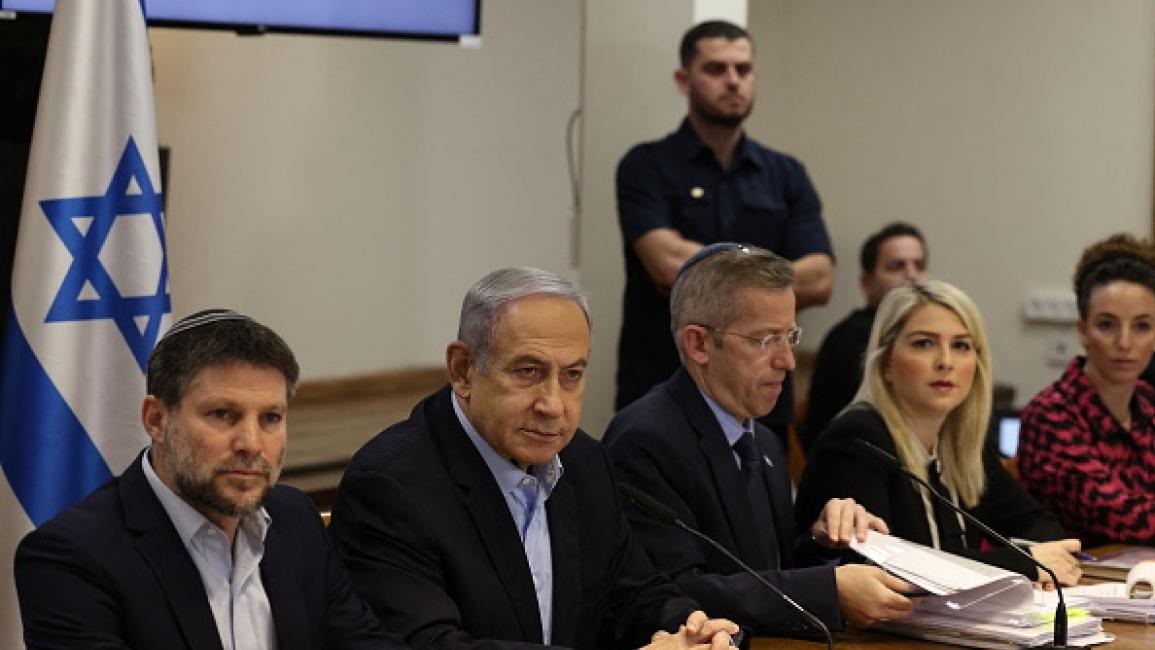Netanyahu Plans Security Cabinet Meeting to Discuss Second Phase of Prisoner Exchange Deal
Israel sets strict demands for Hamas, including exile of leaders and dismantling of Al-Qassam Brigades, as political tensions rise over the war’s future.

Watan-The Israeli occupation government’s Prime Minister, Benjamin Netanyahu, is planning to convene the Ministerial Council for Political and Security Affairs (the Cabinet) tomorrow, Tuesday, to discuss Israel’s demands for the second phase of the prisoner exchange deal—demands that the occupation estimates Hamas will “reject.”
According to the “Ynet” website on Monday, Israel’s expected demands to be presented to the Cabinet include the exile of Hamas leaders outside the Gaza Strip, the dismantling of the Al-Qassam Brigades (Hamas’ military wing), and the release of all Israeli detainees. If Hamas agrees to these demands, Israel claims that “the war would be over.”
Negotiations for the second phase, which were supposed to begin last Monday—when the first phase had been completed after 16 days—will not commence until after the Cabinet meeting tomorrow. Meanwhile, the Israeli delegation currently in the Qatari capital, Doha, is authorized only to discuss the completion of the first phase of the deal “to ensure no further violations occur.”
Israeli Delegation in Doha and the Ongoing Prisoner Exchange Negotiations
The Israeli delegation in Doha includes the head of the Prisoners and Missing Persons Bureau, Gal Hirsch, and the outgoing deputy head of the Shin Bet. Their role is to monitor the deal’s implementation and handle other technical matters, including the release of three additional prisoners in the upcoming sixth batch.
According to the website, Netanyahu, former U.S. President Donald Trump, and Trump’s Middle East envoy, Steve Whitkoff, have reached an agreement on a set of key principles for the second phase, summarized in the aforementioned demands. If Hamas rejects them, Israel will attempt to prolong the first phase to ensure the release of as many Israeli prisoners as possible.

Israel continues to highlight the weight loss of three of its recently released prisoners, attributing it to “starvation” and the blockade it imposed on Gaza throughout the genocide it committed. However, it ignores the harrowing scenes of Palestinian prisoners emerging from Israeli prisons and their shocking testimonies about the inhumane conditions they endured up until their release.
According to Palestinian prisoners’ organizations, detainees suffer from starvation policies and inhumane conditions imposed by prison authorities, including prolonged power and water cuts, denial of outdoor breaks (“fawrah”), confiscation of personal belongings (despite their scarcity), deliberate medical neglect, lack of hygiene and personal care supplies, physical assaults, torture, and sexual crimes committed by prison guards in the “Sde Teiman” detention facility, as documented by former detainees and their lawyers.
In line with its focus on its own prisoners, the website quoted an Israeli official saying that “in response to Hamas’ policy of starving the hostages, Israel is considering certain measures, including freezing humanitarian aid to Gaza.” However, the same official claimed that “Netanyahu will not break the rules or blow up the deal, but Hamas will get what it deserves.” He added, “We are the ones swallowing the frog now, but they (Hamas) will pay the price later,” implying that enduring the current situation is a temporary tactic until the first phase concludes.
The Israeli official further claimed, “The war is not the goal; it is a means to retrieve the hostages.” He stressed that “Israel is determined to free all the hostages, whether through a deal or by returning to war through other means.”
“The Day After” in Gaza
The second phase of the deal, which includes ending the war, effectively represents “the day after” in Gaza. Therefore, according to the website, the list of demands previously presented by Hamas “crossed all red lines for Israel.” In this context, the website noted that Hamas’ primary demand for releasing the remaining 65 Israeli detainees not included in the first phase is a complete end to the war and a lasting ceasefire, under which Israel would fully withdraw from Gaza to allow for reconstruction.
If Hamas refuses to extend the first phase and it ends with the return of 33 detainees, Israel will face the question of whether to resume the war while 65 detainees, some still alive, remain in Hamas’ custody.

Smotrich Threatens: Continue the War or Leave the Government
On the other hand, moving to the second phase while accepting Hamas’ demands could put Netanyahu in a political bind. Finance Minister Bezalel Smotrich and his Religious Zionism party have already declared that once the first phase concludes, they will demand a return to war and the destruction of Hamas as a condition for remaining in the government.
Smotrich reiterated last night that Hamas’ demands, including its continued rule in Gaza, “would set a dangerous precedent for the future.” He asked, “What comes next? Will they kidnap more Israelis and demand Israel’s withdrawal from Judea and Samaria (the biblical term for the West Bank), the evacuation of settlements, and the establishment of a Palestinian state in exchange for their release? That is a red line that must not be crossed.”
He added, “Some will say we already crossed this red line in the current phase of the deal by agreeing to withdraw from the Netzarim Corridor and allowing Gaza residents to return to the north. That is true, and it is one of the reasons we opposed the deal. But this is only a temporary step and should not become a slippery and dangerous slope.”
Smotrich concluded by saying, “The clear red line must not be crossed. We must not make political concessions as part of a hostage deal. No responsible leader would make political decisions under political dictates as part of such a deal. Anyone who does so does not deserve to be a leader.” He stressed that “our government will not surrender to this madness.”






